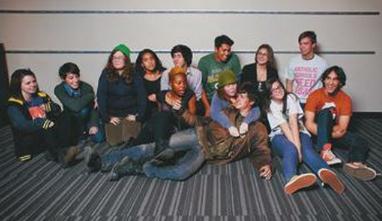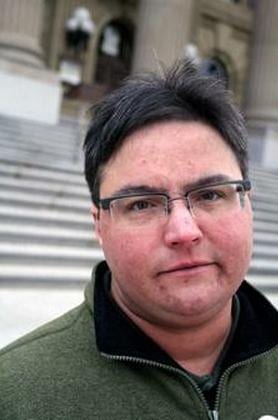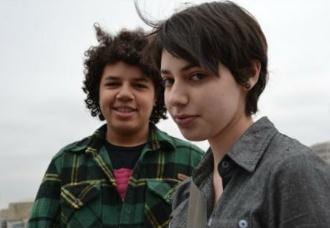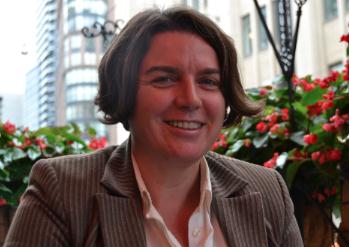
Ontario GSA students. Credit: N Maxwell Lander

Jan Buterman. Credit: Xtra file photo

Mississauga Catholic students and GSA activists Taechun Menns and Leanne Iskander when they first went public to Xtra in January 2011. Credit: Andrea Houston (file photo)
When Tonya Callaghan was a teacher at a Calgary Catholic school in 2004, a young gay student at her school killed himself. The tragedy changed the course of her life forever.
Callaghan quit her job, deciding, as a queer woman, she could no longer live in the closet. She went back to university determined to find out why Catholic schools are such “hotbeds of homophobia.”
“The reason is because of Catholic doctrine that directs all the policy and practice in those schools regarding sexual minority groups,” she says. “The doctrine flies in the face of the laws of the land and Canadian equality rights.”
Callaghan’s PhD research at the Ontario Institute for Studies in Education, entitled “Holy Homophobia: Doctrinal Disciplining of Non-Heterosexuals in Canadian Catholic Schools,” caught the attention of the Canadian Association for the Study of Women and Education (CASWE), which honoured her with its doctoral award for outstanding dissertation. She presented her work at the group’s conference in Waterloo, Ontario, on May 30.
Callaghan’s work also earned her the Governor General’s Academic Gold Medal.
The five-year study compared Catholic education in Alberta and Ontario, looking specifically at the experience of students and teachers. Callaghan interviewed 20 people, sometimes multiple times, and generated an enormous amount of data. She says that in the national movement to eradicate faith-based homophobic bullying, Ontario is ground zero.
“My study finds students are leading this revolution,” she says. “That’s not to say the queer teachers aren’t trying. I was a queer Catholic teacher myself once. I tried to do what I could from within the system, but teachers’ hands are tied. Many are being fired.”
The former Catholic teacher says she didn’t wait for the school to fire her. After the suicide of the promising Grade 12 drama student, who suffered months of homophobic bullying, she resigned.
“He did seek guidance at school,” she says. “The counsellor gave him the Catholic party line: ‘It’s okay to be gay, just don’t act on it. And if you do act on it, you’re a sinner.’ This boy was being bullied. He asks for help and gets more bullying from the guidance counsellor.
“That’s why the Pastoral Guidelines to Assist Students of Same-Sex Attraction are so dangerous. The bishops insist that the document be taught to everyone, especially guidance counsellors, and disseminated to students. They say ‘same-sex attraction’ because they want it to sound like an illness, which is why you need ‘pastoral care.’”
Based on the Catholic catechism, the Pastoral Guidelines are the primary counselling resource used by Catholic educators. The guidelines state that gay people are “intrinsically disordered” and “gravely depraved.” Callaghan says the doctrine is like bullying to queer youth.
Likewise, teaching at a Catholic school was difficult, she says. “I was out before, so it was a big deal for me to go back into the closet to take a teaching job.
“Minute by minute I experienced homophobia in that school, every single day. Slurs in the hallways. I was a young woman, so I constantly got asked, ‘Where’s your boyfriend?’ ‘Why aren’t you married?’ Constantly. It was a really hard experience to have to hide all the time.”
For most teachers, getting fired is not an option. Teaching jobs are scarce, so queer teachers keep their heads down, don’t talk about sexuality or gender and endure the homophobic jokes, she says. “Teachers have a lot to lose if they try to take on the system.”
Callaghan’s research is a collection of firsthand accounts. There’s the story of a gay Toronto-area teacher who was fired in 1998 after the school hired a private investigator to spy on his backyard marriage ceremony. Another participant, a straight teacher in Calgary, was fired in 2004 after she defied her principal by creating a safe space at school for queer students to eat lunch without fear of being bullied.
Callaghan also interviews Jan Buterman, the trans man from Edmonton who was fired when he told his school principal he was beginning transition. Buterman was told his “values were not in line with the Catholic Church.”
“When they’re fired, teachers are blindsided,” Callaghan says. “They are focused on staying monetarily afloat and getting another job. They usually don’t have the means to launch a legal challenge.”
Many student participants told Callaghan that when they disclosed their sexual orientation or gender identity to guidance counsellors, they were outed to their parents, she says.
“Catholic doctrine states that the parent is the number one educator of the child,” she says. “This is consistent behaviour. Schools want the parent to know about [the student’s] sexuality, if they don’t already, because they want the parent to correct it. That’s what they are hoping for, that parents will send their child to reparative therapy.”
Many students Callaghan spoke with were kicked out of their homes, often when school authorities outed them, she says. “We know quite a few homeless youth are LGBTQ, and a large number of those come from devoutly religious families.”
Since it was revealed in 2011 that the Halton Catholic District School Board banned GSAs, and the board chair compared them to Nazi groups, Callaghan has been closely watching the fight in Ontario. She applauds the provincial Liberals for writing a law in support of students.
“I’m really happy about Bill 13. It sets a great example for the rest of the country,” she says.
She is also reaching out to GSA students, like Mississauga’s Leanne Iskander, to offer support. “I like to see the students push the administration. Put up a rainbow poster. See what happens. What’s wrong with rainbows? What’s wrong with the word gay?”
“For Catholic administrators the word gay is affirming sexuality that is non-heterosexual. They don’t want the clubs to be affirming. They don’t want students celebrating their identity.”
That’s why it’s vital that GSAs be established in Catholic schools, she says, because queer students are often completely cut off from supports, like the LGBT Youth Line and local queer youth groups.
“They don’t know supports exist. They are not hearing about it at schools, they’re not hearing about it from their parents, they’re not hearing about it from their church, so how are they going to know? Queer youth who suffer the most come from faith-based homes. That’s why gay-straight alliances are absolutely essential.”
With Bill 13 in place, Callaghan says, legislators should now turn their attention to the content of GSAs, start questioning Catholic doctrine and have a public debate about whether it should be taught in publicly funded schools.
“I think Canada is ready for this kind of discussion, to start looking at the limits of religious freedom,” she says. “When certain religious beliefs call for the suppression of human rights, that’s when we have a problem. We currently have that problem in Catholic schools here in Ontario, as well as Alberta and Saskatchewan. Even in British Columbia, which has private Catholic schools. We will have to address all private religious schools as well, eventually.”
Holy Homophobia Dissertation_abstract Holy Homophobia Summary Holy Homophobia Callaghan Full Thesis

 Why you can trust Xtra
Why you can trust Xtra


